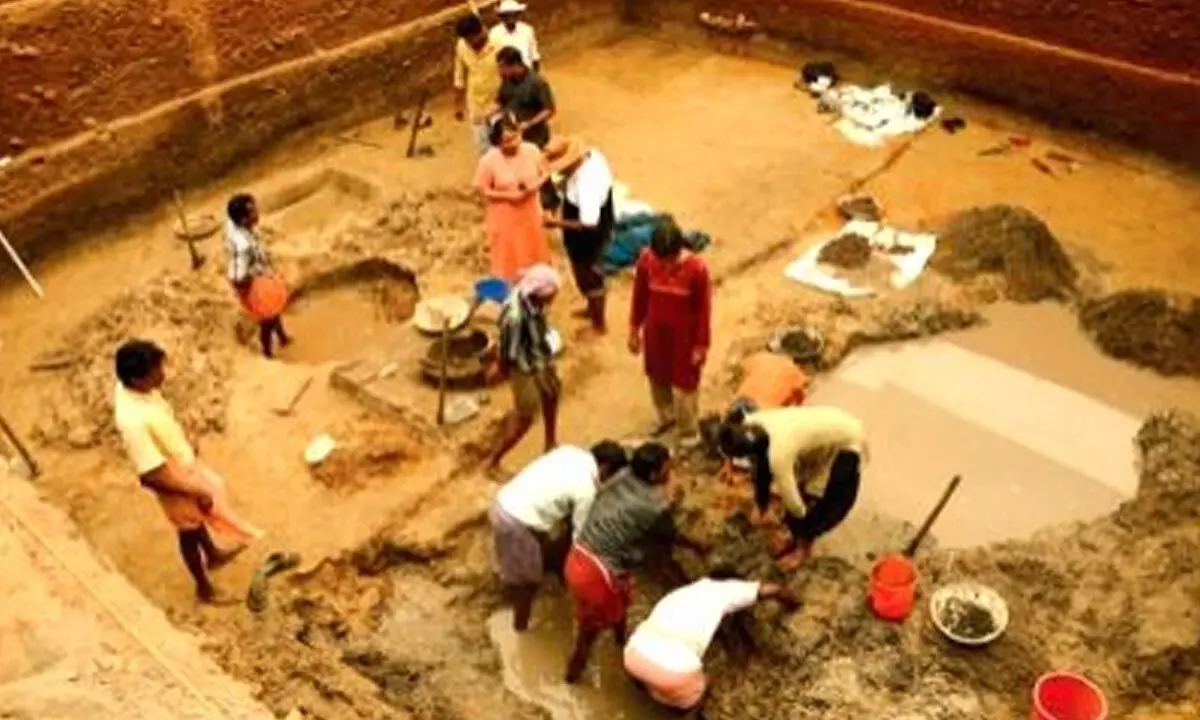Live
- GMR Airports Unveils AI-Powered Digital Twin Platform to Transform Airport Operations
- India poised to become leading maritime player: PM Modi
- Top Causes of Kidney Stones and How to Recognize Silent Symptoms
- India’s renewable energy capacity logs 14.2 pc growth at 213.7 GW
- Winter Session of Odisha Assembly adjourned sine die
- Biden calls Trump's tariff approach 'major mistake'
- After Drama Over Eknath Shinde’s Chief Minister Race, Maharashtra Cabinet Formation Faces New Tensions
- Egyptian FM, Blinken discuss recent developments in Syria
- Iran's supreme leader says Syria's developments result of US-Israeli 'plot'
- Elon Musk to Purchase $100 Million Luxury Mansion Next to Donald Trump's Mar-a-Lago, Report Reveals
Just In
Ancient DNA research confirms West Eurasian genetic imprints in Pattanam

Ancient DNA research confirms West Eurasian genetic imprints in Pattanam (Photo/IANS)
The recent evidences from the archaeological site at Pattanam, on the South-Western coast in Kerala's Ernakulam district
Hyderabad: The recent evidences from the archaeological site at Pattanam, on the South-Western coast in Kerala's Ernakulam district, and their ancient DNA analyses strengthen the belief of historians that Pattanam played an "instrumental role" in trade and cultural exchanges between India and the Middle East and others, scientists said on Friday.
The archaeological site at Pattanam is believed to be part of the ancient port city of the Muziris. Historians consider the city of Pattanam to have played an instrumental role in trade and cultural exchanges between India and the Middle East, North Africa and the Mediterranean regions. The belief stems from the classical Greco-Roman records as well as Tamil and Sanskrit sources.
"The recent and more conclusive archaeological evidences from Pattanam, and their ancient DNA analyses led by chief scientist at CSIR-Centre for Cellular and Molecular Biology (CCMB) Kumarasamy Thangaraj and PJ Cherian strengthen the belief, and is now published in the journal, Genes," the city-based CCMB said in a release. At the Pattanam Archaeological Site, scientists and archaeologists have found, among others, human bones, storage jars, a gold ornament, glass beads, stone beads, utilitarian objects made of stone, copper and iron, pottery, early Chera coins, brick wall and a six-meter-long wooden canoe parallel to the wharf structure about 2.5 m below surface level, it said.
"These structures indicate a vast 'urban' settlement. The excavations suggest that the site was first occupied by the indigenous "Megalithic" (Iron Age) people, followed by the Roman contact in the Early Historic Period. It appears that the site was continuously occupied at least from the 2nd century BC to the 10th century AD," said PJ Cherian, from PAMA Institute for the Advancement of Transdisciplinary Archaeological Sciences, Ernakulam district of Kerala.
Scientists used the DNA from the human skeletons to pinpoint the genetic ancestry of the people found in the region. Niraj Rai, co-corresponding author of the paper, and a Senior Scientist, DST-Birbal Sahni Institute of Palaeosciences, Lucknow said, "We have analysed the mitochondrial DNA of 12 ancient skeletal samples. We found that these samples show the presence of both South Asian and West Eurasian-specific lineages." The harsh climatic conditions of India are not always favourable to ancient DNA research. "Most of the excavated skeletal remains from the Pattanam site were in a very fragile state due to the tropical, humid, and acidic soil conditions.
However, we have adopted the best practices in the field of ancient DNA and successfully analysed the samples. The unique imprint of West Eurasian and Mediterranean signatures found in these samples exemplify a continuous inflow of traders and multicultural mixing in ancient South India," said Kumarasamy Thangaraj. "This is the first genetic data generated, so far, to infer their origin and genetic makeup of Pattanam Archaeological Site. And the findings reinforce the early historical occupation of culturally, religiously, and ethnically diverse groups at the Pattanam Archaeological Site," said Vinay Kumar Nandicoori, Director, CCMB.

© 2024 Hyderabad Media House Limited/The Hans India. All rights reserved. Powered by hocalwire.com






